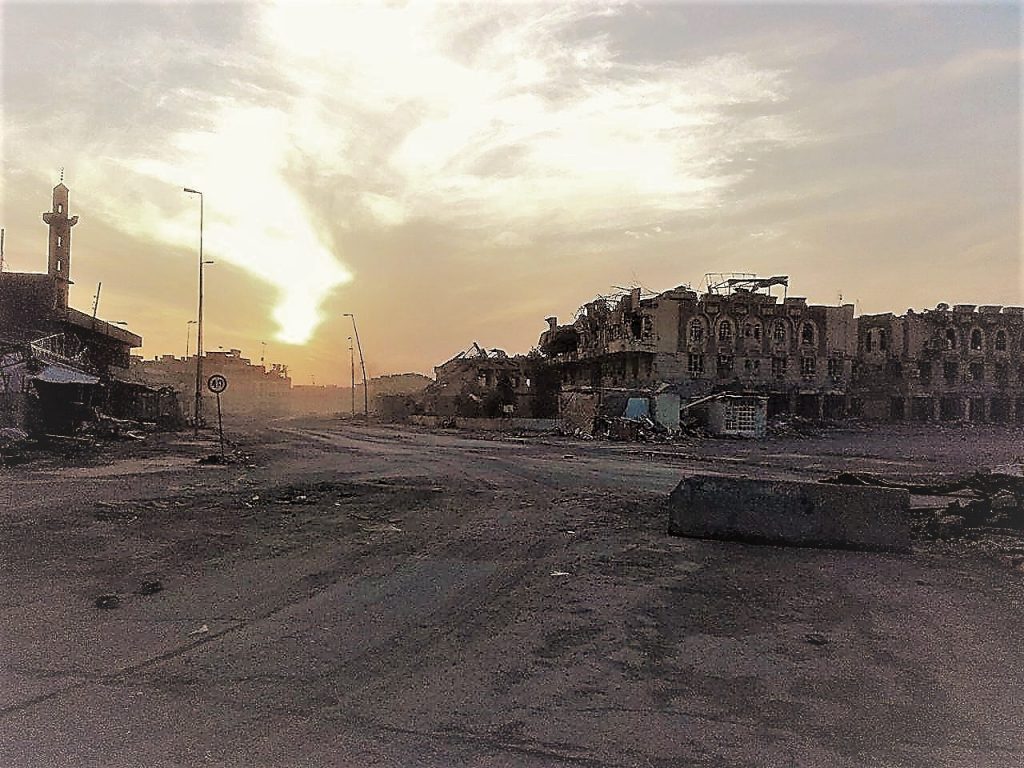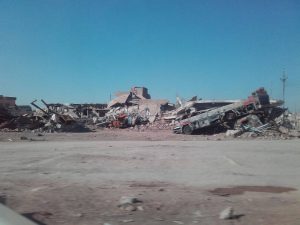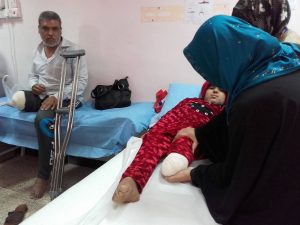Post-ISIS Mosul, pt 1: The final death of a city?
By Boštjan Videmšek/DELO
Its building turned to dust, its citizens traumatised and impoverished, Mosul may have been ‘liberated' from ISIS but it has become a graveyard. Can this razed and devastated city ever be free again?

Monday 11 December 2017
The orange sun was slowly setting over the sooty ruins of west Mosul. Nine months of clashes between the Islamic State (ISIS or ISIL) and a coalition of the Iraqi army, Shia militias and US-led international forces had pummeled the town with some of the most savage urban warfare the world has seen since World War II. Today, west Mosul barely exists: 80% of all buildings have been razed or damaged, while the old city centre is no more. The devastation in Iraq's second largest city is worse than that in Stalingrad and covers a larger geographical area than Hiroshima during World War II.
Rubble, rubble everywhere. Entire blocks have been returned to dust. There are bomb craters everywhere, enormous piles of refuse, hundreds if not thousands of burned-out hunks of cars and trucks. The city is a labyrinth of destruction, an exitless maze expressing the demise of the very concept of humanity.
This is hardly an exaggeration. Collapsed high-rises lying in imploded heaps like contaminated mountains of blancmange. The all-pervasive smell of organic rot. A lone mosque braving it out in the middle of a flattened plain where a residential district used to be. An entire health-care complex – ‘Medical City' – razed to the ground. Someone seems to have done a passable job of clearing the main thoroughfares, but all they lead to is further images of unspeakable horror.
Let us not shy away from these scenes. A house, somehow unharmed, shimmering like a mirage amid a desert of nothingness. The skeletal remains of a factory and the bared foundations of municipal facilities. Spent large-calibre shells scattered across piles of sand. Tremendous heaps of impossibly twisted scrap metal which, in a European city, might have been taken for an art installation. Caved-in side streets. A graveyard with smashed headstones, regarded as an act of blasphemy by the masterminds of ISIS. Something that might have been a football field. A small curly palm tree that had somehow survived nine months of incessant bombs, rockets, mortar shells, mines and grenades. A lone emaciated cow dementedly grazing on a chunk of plastic. Splayed animal carcasses. The long line in front of the only functioning petrol station, symbolising of the cankerous economic underbelly of Iraq's plight.
In a word, west Mosul looks like a tomb. What used to be a town is now a huge evil crater that has sucked in thousands of innocent souls.
The fire sale

Hundreds of trucks from Erbil and the northern Kurdish region bring in a stream of building materials. But little in west Mosul gives the impression that any sort of reconstruction is even possible. At the same time, hundreds of trucks are taking scrap metal from Mosul to Erbil and the Kurdish regions. Groups of men are transporting old bricks in wheelbarrows, all of them headed for the gigantic fire sale west Mosul has now become.
Even after immersing yourself in Mosul's wasteland, it is still hard to believe one's eyes. Following a knee-jerk impulse, they remain quick to turn from the scenes of utter desolation.
How is anything expected to live here ever again?
Yet for some this is merely business as usual. A patrol of the Iraqi Federal Police, backed up by a high-flying chopper treated to a bird's eye view of all this nothingness. The freshly sown flags and the childishly colourful religious iconography of the Hashd al-Shaabi militiamen, who helped ‘liberate' the Sunni western part of town. Flashes of a monstrous marauding force that had long been laying waste to everything in its path.
Lest we forget: in June 2014, the self-proclaimed Islamic State convoy took Mosul virtually without a fight. The Iraqi army simply scattered to the winds, leaving behind a treasure trove of mostly American weapons. The same Iraqi army that had been disbanded in the fall of 2003, turning over the entire state to the whims of religious militias, is now helping to liberate the city it had terrorised between 2005 and 2014.
No. This razed, thoroughly defeated city is not and is never meant to be free again.
A game of Russian roulette
The oily Tigris still occasionally washes up a corpse. Four out of five bridges across the river have been destroyed. Over the remaining one, traffic is sputtering along in a grand slalom between the Iraqi army and Shia militia checkpoints.
The Tigris' entire west bank, where the ISIS fighters had dug themselves in until the bitter end, has been bombed clean. The tunnels the fighters used to move across the city have been filled in. Those brave enough to have remained in west Mosul fear that the underground still hides a number of ‘sleeper cells'. And that whatever's down there can easily be spewed forth again.
Here amid the rubble which still entombs hundreds of corpses, any semblance of a sense of security is but a cruel joke. Large parts of the area are riddled with mines, and there is no map. Life – or whatever is still left of it – has been turned into a game of Russian roulette.
***
A 10-year-old girl named Nada refused to let the doctors at a rehabilitation centre operated by the NGO Handicap International in the eastern and significantly less afflicted part of Mosul anywhere near her, at least at first. She was very much afraid of them. After all, it was doctors who had stolen her left foot.
On 4 April 2017, she was hanging around in the courtyard of her home in Mosul's Janjili quarter, which had been completely devastated during the months of the offensive. The house was suddenly struck by a rocket – to this day, no one knows whose. The shrapnel hit Nada in her left foot and her jaw. Her father Adel took a nasty hit to his leg. A couple of Nada's relatives were killed in the assault. The neighbours took them to the only functioning hospital, which happened to be controlled by ISIS.
The two doctors on hand first ignored Nada and her father. Priority went to the wounded Sunni militia extremists. According to numerous reports, the doctors only helped those civilians who had openly supported the ISIS ‘caliphate'. Adel was left bleeding in his chair for 10 hours. After that, they simply sawed off his right leg.
Nada herself was left to her excruciating pain for two days. The ‘doctors' could have saved her foot, but it simply wasn't a priority. After a while, her wounds became infected and started overflowing with pus. At the end of the two days, a doctor finally came along and amputated the leg under the knee. Then he sent her and her father home, even though they no longer had one.
The fighting was still far from over. The entire family moved in with the grandfather, where three other war-devastated families already lived.

“I want to go to school,” Nada told me. Wearing a pretty red dress, Nada also shared that before her town got destroyed she used to be in third grade at the local school.
As her mother held her hand, the physical therapist was working to exercise the stump of the little girl's left foot – the one that was later fitted with a prosthetic device. From the way she surrendered herself completely to the therapist's gentle care, it was clear Nada had been released from much of her fear of doctors. On two different occasions, she even flashed a bashful smile.
On the whole, her bright and curious eyes seemed filled with a renewed confidence, perhaps because she had regained the ability to walk. And she was doing so well. She had been promised she would soon depart for Jordan, where Médecins sans Frontiéres agreed to operate on her damaged jaw. This means she might one day be able to eat normally again.
Yet the bureaucrats, naturally enough, seem bent on jeopardising her trip to Aman. An all but irrelevant fact is that her family had gone bankrupt.
As for her grey-haired and bearded father Adel, the war had not merely cost him his right leg but also stripped him of the taxi he used to drive to support his family. His vehicle had been his one means of making a living. As I spoke to him, he was supposed to be on medication, but he simply could not afford it. With the help of his extended family he was able somehow to make ends meet and make his regular rehabilitation sessions. However, the second his luck runs out, the whole family will be facing a new level of dire straits.
An engineer, not a soldier
In mid-March, 19-year-old Dawood was tending a flock of sheep as they grazed. After stepping on a mine, his right hand and left foot were blown off. Some relatives heard the sharp detonation and ran over to where he lay mangled on the ground. He was bleeding profusely and he had lost consciousness, yet they managed to save his life… or at least an approximation of it.
After the conclusion of the grand military operation, Dawood and his parents visited the newly opened rehabilitation clinic. That was in the middle of June. The day we came to visit was the day Dawood could officially walk again, an occasion for celebration.
“I wanted to be a soldier,” he nodded proudly, his body language exuding pride at the stupendous feat he had accomplished. “But since I have lost an arm and a leg, the army won't take me. Now I want to be an engineer.”
Dawood carefully raised himself up to his feet and took a few tentative steps, his eyes flashing determination and defiance. He employed his prosthetic right hand to grab a plastic cup and eased it up toward his mouth. “Now I can drink tea by myself,” he declared proudly and broke into a grin all the more impressive for its impishness.
***
“It is very hard to find a single person in Mosul who hasn't lost a loved one or been wounded themselves. Round here, we mostly take care of the amputees: 70% of the 310 people in our care lost an arm or a leg in the raids. In total, some 18,000 people were wounded. There was a tremendous amount of amputations. In many cases, it had been done as a form of sanction – as punishment for disloyalty,” explained Fanny Mraz, head of Handicap International‘s mission in Iraq.
The two years she has spent here have afforded her a very close view of the entire socio-political climate. Her patients' injuries were not merely of the physical variety. Around here, signs of post-traumatic stress syndrome were so rife they were virtually omnipresent. The trauma of nine months of savage bombardment, following the two years of ISIS's reign of terror, which came after the root cause of it all, the western invasion and occupation, had cut deep into the marrow of all residents of the ransacked city.
“So much trauma has been piled up on these people,” Ibrahim Khalil, a doctor with the International Medical Corps, said while shaking his head. “Well, at least they're now learning to speak openly about their pain – something rather unusual in these parts. Nonetheless, we are still at the beginning of our mission. So many people here need help. Some thousand people are now taking part in our psycho-social rehabilitation programme. For them, this war won't be over for quite a while yet. All the public services having been dismantled, all of us here are facing a tremendous workload.”
__
Watch this space for part 2


